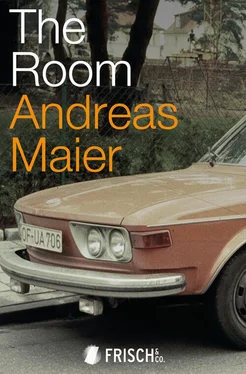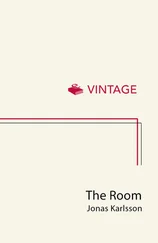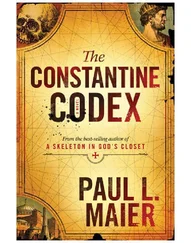My uncle J’s room is on the first floor, overlooking Uhlandstrasse, directly opposite the bathroom that he probably wasn’t even allowed to use. During most of the time I spent there with my grandmother when I was a child, he would be sleeping, and then the whole house would stink. If he was out, which meant lugging packages around in Frankfurt, the smell would linger on regardless. The house essentially reeked of J’s silage-like stench for years. It started back when I was eight or nine years old, because he still washed himself relatively often before that. Even today, my nostrils remind me of J whenever I go down into the cellar, his territory, at the Uhlandstrasse house. They built a bathroom down there especially for him, with a shower cubicle and toilet. The cellar was where he led his subsurface existence as a pretend craftsman. J had grown up surrounded by craftsmen, in a family of stonemasons. The business had around thirty employees and was based in Friedberg, three kilometres away. Uncle J spent a lot of time there as an adolescent, there was hammering and sawing and cutting and sanding, and immense cranes scattered all over the place, and technicians keeping the machines in good working order, laborers welding and milling, a blacksmith making the tools and ensuring everything was dimensionally correct — and my uncle, fascinated by it all, began to see himself as a craftsman too and set up a workshop in the Uhlandstrasse cellar, though it was nothing more than a fantasy workshop really, a make-believe workshop. There are still boxes of screws hanging on the walls, and various tools lying around, even though most of them were cleared away twenty years ago after he moved out (J had to leave the house after the death of his mother, my grandmother, with whom he lived until the end of her life, by which time he was over sixty years old). There is still a bench clamp down there, and I remember how — back when J was still alive and still living in the Uhlandstrasse house and his mother was still there and the world was still in order for him, after a fashion, and not yet damaged or even completely destroyed — he used to clamp screws in it, select one of the many iron files with great care, check and adjust the position of the screw in the clamp according to some particular idea or craftsman’s system that he had dreamt up, then begin to file, while I, the child, could never resist asking why he was doing it, or in other words for what purpose he was filing the screw, if that was what he happened to be doing. J would then explain to me, in a despairing kind of rage, the roles of all the instruments he was using at that moment (“The bench clamp is for clamping screws — look, this is how you open it, and this is how you close it.”), but he never answered my actual questions — they didn’t seem to even exist for him. He noticed that something wasn’t quite right, though, and that enraged him. Over time, he grasped the fact that I didn’t buy his screw-filing story. There he stood, my uncle J, over forty years old back then, alongside me in the cellar, his territory, the workshop in which he was able to be what he never was and had never been allowed to become, and the child kept asking questions, and Uncle J just kept filing away with ever-increasing rage until eventually he collapsed into cursing, followed by complete and utter silence.
I remember how I always used to get the creeps when I went down into the cellar, knowing that, at least in part, it was my uncle’s realm. The laundry room was down there too, and a room for drying the washing, as well as the wine cellar, and J’s workshop was right next to the drying room, which meant you had to walk through the workshop (which strictly speaking was a room of around six or seven square metres), in order to get to the cool chamber where the wine was kept. This meant that the workshop was a publicly accessible space, unlike J’s bedroom on the first floor. Most of my encounters with J took place in the workshop. He rarely spent any time in the living room back then, at least not when someone else was also in my grandmother’s house. The workshop was his hobby, maybe even his life’s purpose — aside from the women, about whom everything I know is based on speculation. Speculation and, to be fair, a few pretty obvious clues. I have to admit that, to start with, I genuinely believed J was a craftsman, a wrought iron specialist. Perhaps, initially, I thought he was working on something in the cellar that was connected to the masonry business. Even later, once I had realised that J was purely and simply working ‘independently’ down there, I still assumed that he was actually making and creating something, or at the very least repairing something. There used to be small generators and engines and switches lying around too, and the mere fact that they were lying around made me think that J knew what they all were and how to put them to use. In reality, though, he would just take these things with him when they were thrown out by the company, take them to pieces at home, then stare vacantly at the remains without understanding them in the slightest — for when it came down to it, even if it wasn’t always apparent at first glance, Uncle J was an idiot.
He wasn’t even doing what obscure dilettante artists do, taking different materials and parts and leftover things intended for entirely different uses and making them into collages or strange apparatus or mobiles which, although functionless, represent an achievement for their creators, due to their size, the number of parts they consist of or their fantastical form. No, back then I soon came to believe — and am still firmly convinced to this day — that for J the workshop served one purpose only: to belong to the world upstairs, and in particular to the world of the masonry business three kilometres away. According to my mother, my uncle J was never accepted by his father, my grandfather, whatever the word ‘accepted’ might mean when used in reference to my uncle.
After all, in my case it went far beyond not accepting my uncle J; instead, with the way he looked and behaved, he was the epitome of horror to me when I was a child. And even though I eventually realised that my uncle was someone who still had one foot in paradise, it’s difficult for me to imagine how I ever managed to spend an entire half-hour in the cellar with him. Presumably I had to go down there whenever my grandmother went to do her shopping at Schade & Füllgrabe or to meet a friend. I can still remember how uneasy I used to feel there. Even though I would be hoping against hope that I could go back upstairs again soon, time and time again I would watch J’s filing and drilling and sanding, feel bewildered, and end up questioning him (it didn’t even occur to me to give it a rest). As a result, J would get increasingly wound up — all the while making strange hissing sounds and shaking a spanner or wrench about in his hand as if he wanted to beat first some inanimate object and then me — until eventually my grandmother would come down and rescue me.
The fact that it was unusual for a bathroom to have been installed in the cellar for my uncle didn’t even occur to me back then. As far as I was concerned, that place, the Uhlandstrasse house, didn’t have a history but had simply been there forever (after all, I thought I had been there forever too). And because it had been there forever, it didn’t need explanation, any more than the sun or gravity need explanation. In the first years of my life, too few changes took place to prompt me towards the idea that the world, particularly where human beings were concerned, was subject to constant change. I had no idea of how it changed from generation to generation.
Читать дальше











